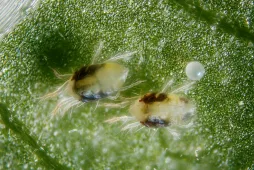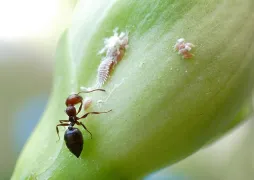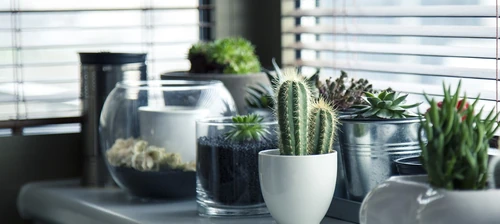Phlebodium aureum 'Blue Star', the little rabbit's foot
You'd like to have a Golden polypod in your home, but you're short of space? Opt for Phlebodium aureum 'Blue Star'. This cultivar of the Polypodiaceae family boasts the same graphic blue fronds. But it's much less bulky!
How to recognize Phlebodium aureum 'Blue Star'?
Phlebodium 'Blue Star' is an upright, epiphytic fern. It grows to no more than 50 cm in all directions.
It has subaerial creeping rhizomes. Brown and covered with fine scales, they look like a soft, hairy rabbit's foot.
Don't be too disappointed when a new leaf appears! Young, elongated fronds look like seaweed. But as they grow, they divide and acquire their triangular or star shape. Blue-green, they have toothed, wavy margins.
Phlebodium 'Blue Star' is grown solely for its decorative foliage. It does not flower or bear fruit.
This fern is non-toxic. It is even said to have pollution-removing properties. A fan of humid environments, it can also purify the air in a room that's too damp, by capturing ambient humidity.
Our maintenance tips
Phlebodium aureum 'Blue Star does not like direct sun or cold. Find a bright spot for your plant, away from the strongest rays and draughts. They also hate getting their hearts wet. When watering, moisten the substrate on the sides, around the foliage.
Watering
Phlebodium aureum 'Blue Star require regular watering. But it must be moderate, otherwise the roots will rot. The substrate must remain moist but never soggy.
Water your plant with soft, non-calcareous water at room temperature. Once you've finished, drain off any water that accumulates in the saucer or planter.
Water your plant with soft, non-calcareous water at room temperature. Once you've finished, drain off any water that accumulates in the saucer or planter.
Spray
If the air in your home is dry, spray the leaves of your plant with non-calcareous water at room temperature.
Repotting
In spring, transfer your Phlebodium aureum 'Blue Star' to a larger pot, so that it can continue to grow.
Get a pierced pot one size larger than the previous one. Phlebodium aureum 'Blue Star has shallow roots. The plant grows mainly in width. You can therefore choose a pot that is wider than it is tall.
Line the bottom with clay balls. For the substrate, prepare a mixture containing two-thirds potting soil for green plants and one-third sand. You can add a little perlite to lighten it. Pour a little of your potting soil into the pot.
Plant your Phlebodium aureum 'Blue Star in the center and top up with substrate. The rhizomes should be flush with the surface and the roots buried. Water copiously with non-calcareous water at room temperature.
Fertilization
You can stimulate the development of your plant during its growth phase, in spring and summer, with fertilizer.
Apply green plant fertilizer to stimulate growth.
Prune
To encourage the growth of your Phlebodium aureum 'Blue Star, prune regularly.
Remove dry or brown fronds to prevent them from rotting and bringing disease. Cut them off at the base with clean, sharp pruning shears or scissors.
Plantation
Once the last spring frosts have passed, you can plant.
Choose a shady spot, along a wall or under a tree for example.
Soak the base of your Phlebodium aureum 'Blue Star while you dig a hole twice the size of the root ball.
Place a layer of compost at the bottom of the hole. If your garden soil is poor, you can enrich it with peat or leaf compost.
Plant your Phlebodium aureum 'Blue Star. The rootball should be level with the soil. Tamp gently and water to encourage rooting.
Apply organic mulch to keep the soil cool and retain moisture.
Cutting
Cutting is carried out during the strong growth phase, generally in spring and early summer.
Take advantage of repotting to multiply the plant by dividing it. Once you've dug up your phlebodium aureum 'Blue Star, locate a rhizome with aerial stems and several fronds. Separate it from the main plant using your hands or a clean, sharp knife.
In a perforated pot, pour a bed of clay balls to optimize drainage.
Then add a rich, draining substrate, such as a mixture of potting soil for green plants, sand and peat. Plant your cutting in the center and fill in with the substrate. Water to remove air bubbles and facilitate rooting.
Diseases / Threats
Information
| Family | Polypodiaceae - Polypodiaceae |
| Type | Phlebodium - Phlebodium |
| Species | Golden polypod - Phlebodium aureum |
| Lifecycle | Perennial |
| Foliage | Evergreen |
| Exposure | |
| Substrats | |
| Planting methods |
Open ground In pots |
| Categories | |
| Tags |
Beginner Fritillary |
| Origins |
North America Central America South America |
| Hardiness (USDA) | 11b |
| Leaf color |
|
Discover plants from the same family
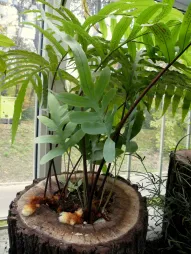
Golden polypod
Discover
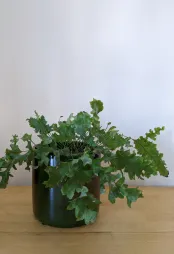
Phlebodium aureum 'Davana
Discover
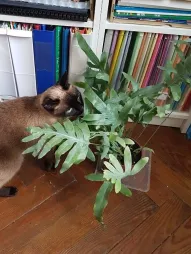
Phlebodium pseudoaureum
Discover
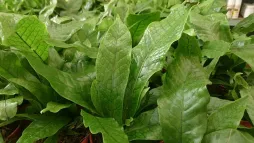
Alligator fern
Discover













